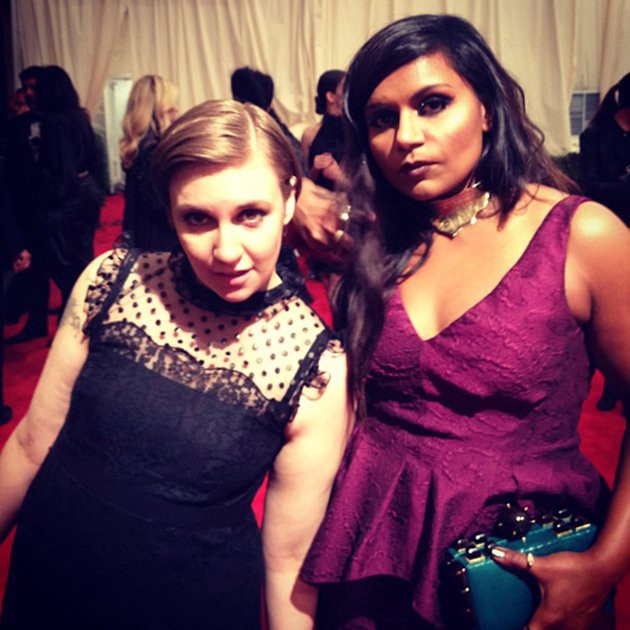It’s tough out there for female showrunners. Women and Hollywood has been documenting
this for years, and it remains true that the women working in these roles — in
comedy and drama, on network and on cable — do not get
their due. It’s not simply about attention, though there is something to be
said for women being treated as authorities of their craft. It is indeed about
the work.
On Tuesday, The Mindy Project wrapped up its second season. The show has been
the subject of much critique and close to cancellation. Co-showrunner Mindy
Kaling was questioned at this year’s South By Southwest about not
having more female doctor characters, whether white or women of color, to which she responded defensively, “I’m a
fucking Indian woman who has her own fucking show.” As if to say: I’m a woman
of color writing, leading, and acting in her own show. What more am I supposed
to be responsible for? She followed up by saying other shows — run by friends
of hers — never get the same questions.
Another common complaint is that Kaling’s character
Mindy Lahiri only dates white men — though the Jezebel
piece on this ends like this: “What’s the use in having your own damn TV show
if you can’t hire a bunch of dudes you’re attracted to and make out with them?” A valid point, especially when considering Seinfeld,
a sitcom from another hyphenate who dates a parade of similar looking and
gorgeous women. Perhaps the internet allows us to dissect in a way we didn’t in
the 90s, but a thorough search turned up no critique of Jerry Seinfeld, except
for this piece meant to call out the double standard that is often applied to Girls.
Which leads perfectly into Girls, a show by co-showrunner and star
Lena Dunham, critiqued as much as Mindy
if not more. Right from the get-go, Dunham had to answer questions about the
blaring lack of diversity in her characters — questions certainly not asked of
Larry David. After an appalling go of it — Donald Glover playing a short-lived
conservative Republican boyfriend for Hannah — this past season balanced out as
the team behind the show realized that to fix their problem, they need only
include people of color as coworkers, old friends, new friends, and romantic
rivals. Some are stereotypes, some simply are. It’s not perfect, but it’s
better — an example of the power of fair critique, and a showrunner wanting to
do better who’s not wholly unable to take constructive criticism on
inclusivity.
Girls also gets criticized for its amount of nudity, but mostly Dunham’s
nudity, which feels like it has everything to do with her form — a body that is average in size, neither thin nor fat. That she would dare show a body that is not
bronzed or a size 00 seems to be the hidden message behind the criticism.
Clothed or not, it seems like everyone has a lot to say about Dunham’s body and
how it is depicted — going so far as to offer $10,000 for untouched photos of a Dunham-Vogue photoshoot — but yet very little to say about other hyphenates like Louis C.K. who lack
the six packs and smoldering eyes of more traditional leading men. Instead, critique of
C.K.’s show Louie mostly tackle
content or production. Imagine that.
To be clear, there’s nothing wrong with
critique. Kaling and Dunham have said as much, that as difficult as it is to
not support all women-created art, one should be “clear about what behaviors
aren’t helping the bigger cause [of feminism],” as Dunham put it in a Rookie publication.
But let’s call a spade a spade. As fair as some or parts of the criticisms
Kaling and Dunham face are, it highlights the double standard that exists. As Women and
Hollywood has already covered,
it’s an entirely different playing field for men, with different rules and
expectations.
The way that Kaling and Dunham are handled is
due, in part, to being front and center. Other female showrunners like Grey’s Anatomy and Scandal’s Shonda Rhimes, The
Killing’s Veena Sud, New Girl’s Liz Meriwether, and Orange Is the New
Black’s Jenji Kohan are simply not as out there as those women working
behind and in front of the camera. This elevated exposure puts them right in
the spotlight, literally, and may explain why they seem to take the heat — not
the show, but they themselves. Of course, the elephant in the room is what’s
already been described above: the unequal treatment of female and male
showrunners.
We need to be honest about what we’re seeing, and clear about the sexism that dictates how female creative leaders are
treated. Kaling addresses this directly: “There are little Indian girls out there who look up to me, and I never want to
belittle the honor of being an inspiration to them. But while I’m talking about why I’m so
different, white male show runners get to talk about their art,” she has said.
Dunham has said she’s embarrassed and feels dumb to address it when she’ll say
something like, “Not to be the girl who cried misogyny, but no one would
ever say that to Larry David!” But she still points it out. It’s never
easy to tell this kind of truth, but when it is called out and published,
there’s an opportunity there for education and, hopefully, change.
Emily U.
Hashimoto writes about feminism, queerness, pop culture, and their
intersections. She has written for Bitch Magazine, Bitch Flicks, and Kalyani
Magazine. You can find her on Twitter at @emilyhash and at books-feminism-everythingelse.







